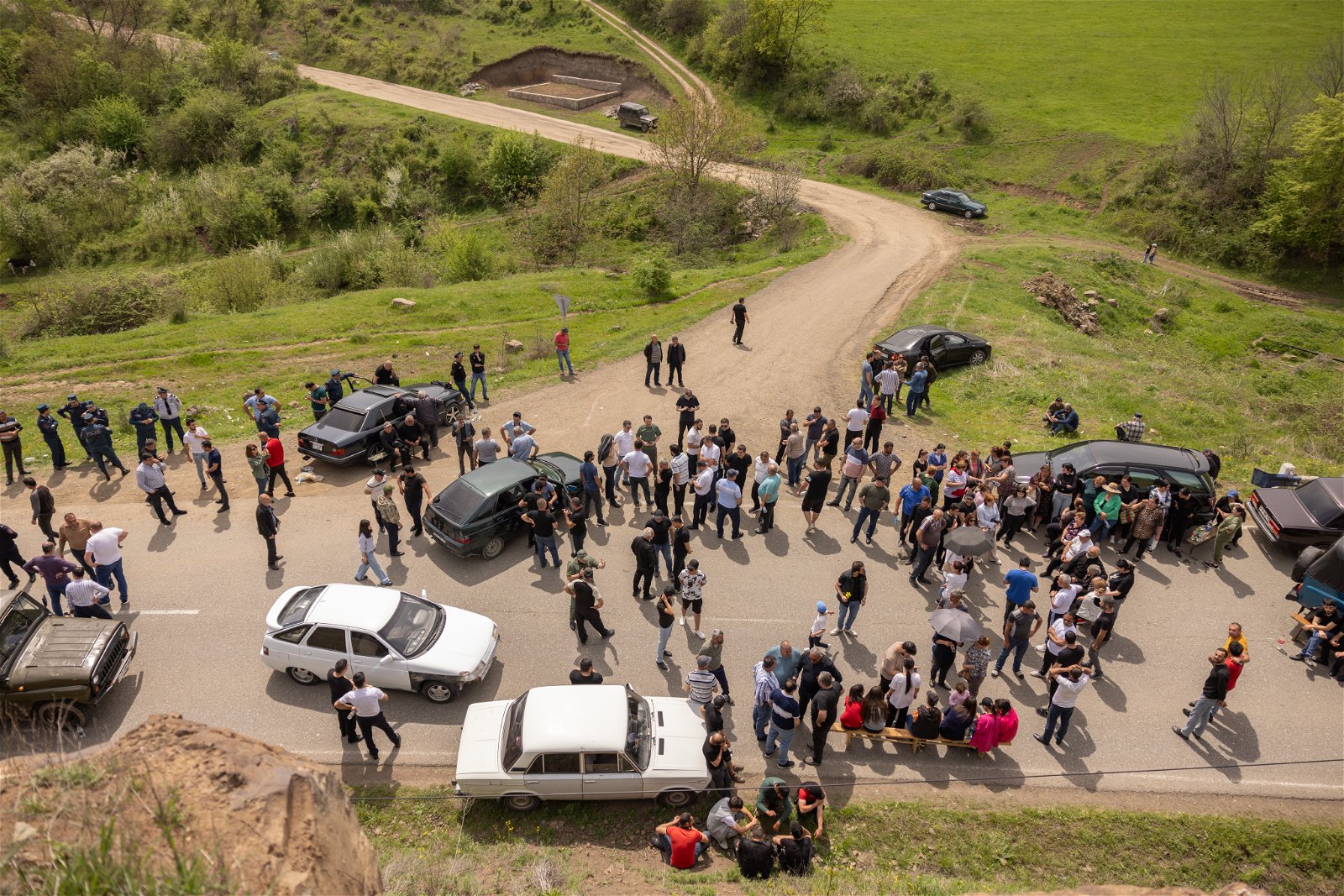
YEREVAN—As the world solemnly commemorated the 109th anniversary of the Armenian Genocide, Armenian Prime Minister Nikol Pashinyan unveiled the commencement of the delimitation and demarcation process in the Tavush region, involving the unilateral handover of four Armenian border villages to Azerbaijan. This move has sparked widespread criticism that Pashinyan has not only undermined Armenian territorial integrity but has also exposed the nation to further vulnerability in the face of relentless aggression from Azerbaijan.
This process began a few days after the eighth meeting of the Commission on Demarcation and Border Security of the State Border between Armenia and Azerbaijan on April 19, 2024. Under the leadership of Armenian Deputy Prime Minister Mher Grigoryan and his Azerbaijani counterpart Shahin Mustafaev, the commission agreed to separate specific sections of the border, in line with historical borders from the Soviet era. Geodetic measurements would be conducted to clarify coordinates, followed by the formulation and signing of a protocol by both parties.
That same day, Grigoryan’s office issued a statement revealing plans to transfer four villages in the Tavush region to Azerbaijan. Additionally, Armenian troops are set to be withdrawn from these areas within a “short and reasonable” timeframe.
Following the commission meeting, the parties agreed to deploy border guard services along agreed upon sections until the demarcation process concludes. They plan to finalize a joint activities regulation agreement, subject to domestic approval by both countries’ legislative bodies. Both parties reaffirmed their commitment to adhere to the 1991 Alma Ata resolution during the demarcation process, ensuring alignment with future peace agreements.
Additionally, the parties will address remaining border sections, including enclave and exclave issues, after the approval of the regulation.
On April 23, Armenia’s government announced the commencement of an expert meeting between Armenia and Azerbaijan to launch the border demarcation process.
Members of the ruling Civil Contract party, along with their supporters, have launched efforts to persuade the public that these regions lack historical significance. Despite their assertions, evidence overwhelmingly contradicts such claims, as discussions about the Armenian heritage of these territories have been extensive.
Pashinyan has also established a new working group, aimed at facilitating discussions on border security and demarcation between Armenia and Azerbaijan. At the helm of this commission is Hayk Ghalumyan, the governor of the Tavush region. Attached to the commission overseeing border affairs, the working group plans to include administrative leaders and residents from various settlements in Tavush including Voskepar, Kirants, Baghanis and Berkaber.
However, this initiative has sparked widespread discontent among local leadership and the populace of these villages, drawing hundreds of local residents and Armenians from across the nation into vehement protest. The demonstrations have closed the Armenia-Georgia interstate road, symbolizing the protesters’ resolute opposition to what they perceive as a treacherous action by the government.
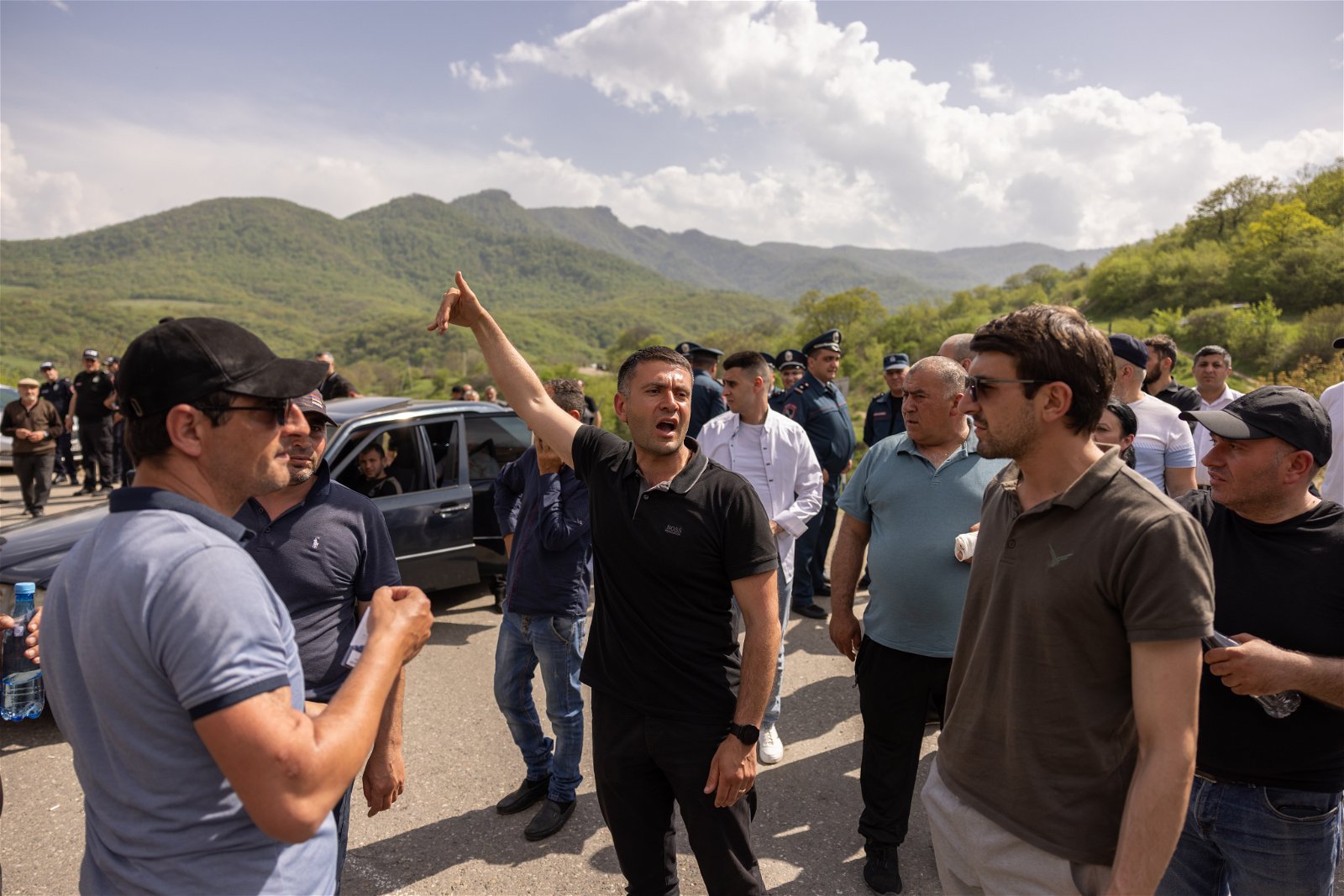
For the sixth consecutive day, the Armenia-Georgia interstate road remains closed at the junction of Kirants-Acharkut villages. Reports emerged on the morning of April 23 suggesting that the Armed Forces received orders to vacate their positions in the conceded territories. Concurrently, ABC media captured footage depicting engineering activities underway in one of the positions within Kirants village.
Subsequently, videos circulated depicting Azerbaijani movement in the Baghanis-Ayrum sector. Armenia is conducting demining operations in the area, resulting in the closure of all main roads leading to Baghanis. Access is limited to alternative routes due to the proximity of demining activities to Baghanis-Ayrum.
Tensions also escalated in the Noyemberyan-Ijevan sector, where citizens, backed by residents of Voskepar, Baghanis and Kirants, barricaded the road, leading to confrontations with the police. Archbishop Bagrat Galstanyan intervened to reopen the road and mitigate further clashes.
Amidst a palpable air of determination, the people of Kirants and surrounding communities stand resolute in their demands. Through the night, men, women, children and elders from Kirants and neighboring regions continued to gather, as highlighted by Archbishop Galstanyan, leader of the Diocese of Tavush and active member of the “Tavush for the Homeland” movement, in an interview with reporters.
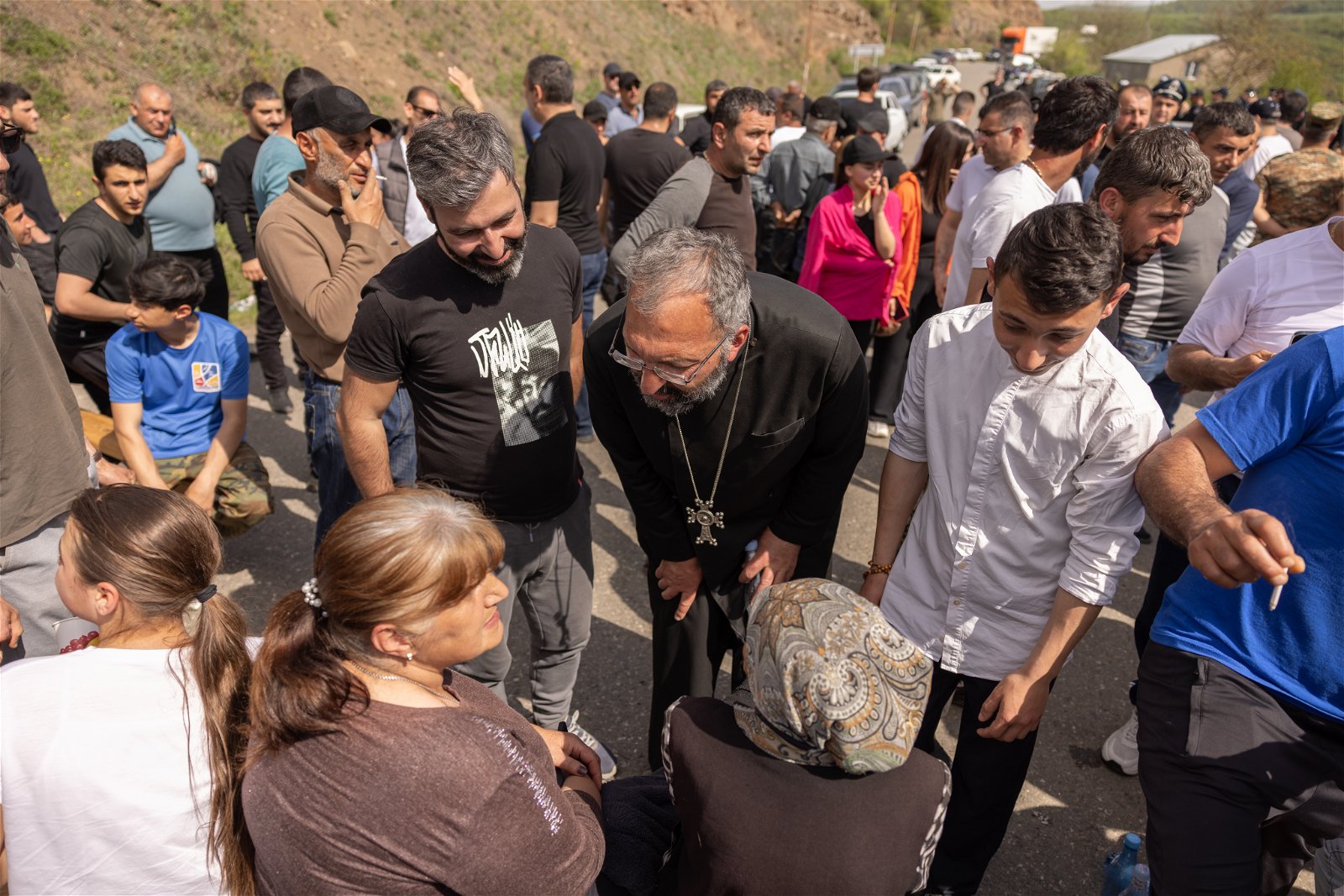
Responding to rumors of potential arrest, Archbishop Galstanyan asserted his unwavering commitment to truth, firmly rooted in his presence in Kirants. “The truth shall not falter, regardless of external pressures or machinations. Our movement is one of conviction—for God, for our homeland and for truth,” he declared.
Archbishop Galstanyan admonished the betrayal of trust by the current regime. “The people were deceived. Our streets are a testament to the broken promises of those who sought power through deceit. Today, we stand against the tyranny of lies,” he said.
Regarding the impending visit of Deputy Prime Minister Grigoryan, Archbishop Galstanyan expressed disdain, dismissing any expectation of dialogue. He denounced attempts to shift responsibility for the demarcation process onto local leaders: “This is not merely a matter for a few leaders. It concerns the very fabric of Armenian statehood.”
Archbishop Galstanyan urged businessmen and citizens alike to rally in defense of Armenian sovereignty: “To all Armenian citizens, this is a moment of reckoning for Armenian statehood. It is time to rise from complacency and defend the values we hold dear.”
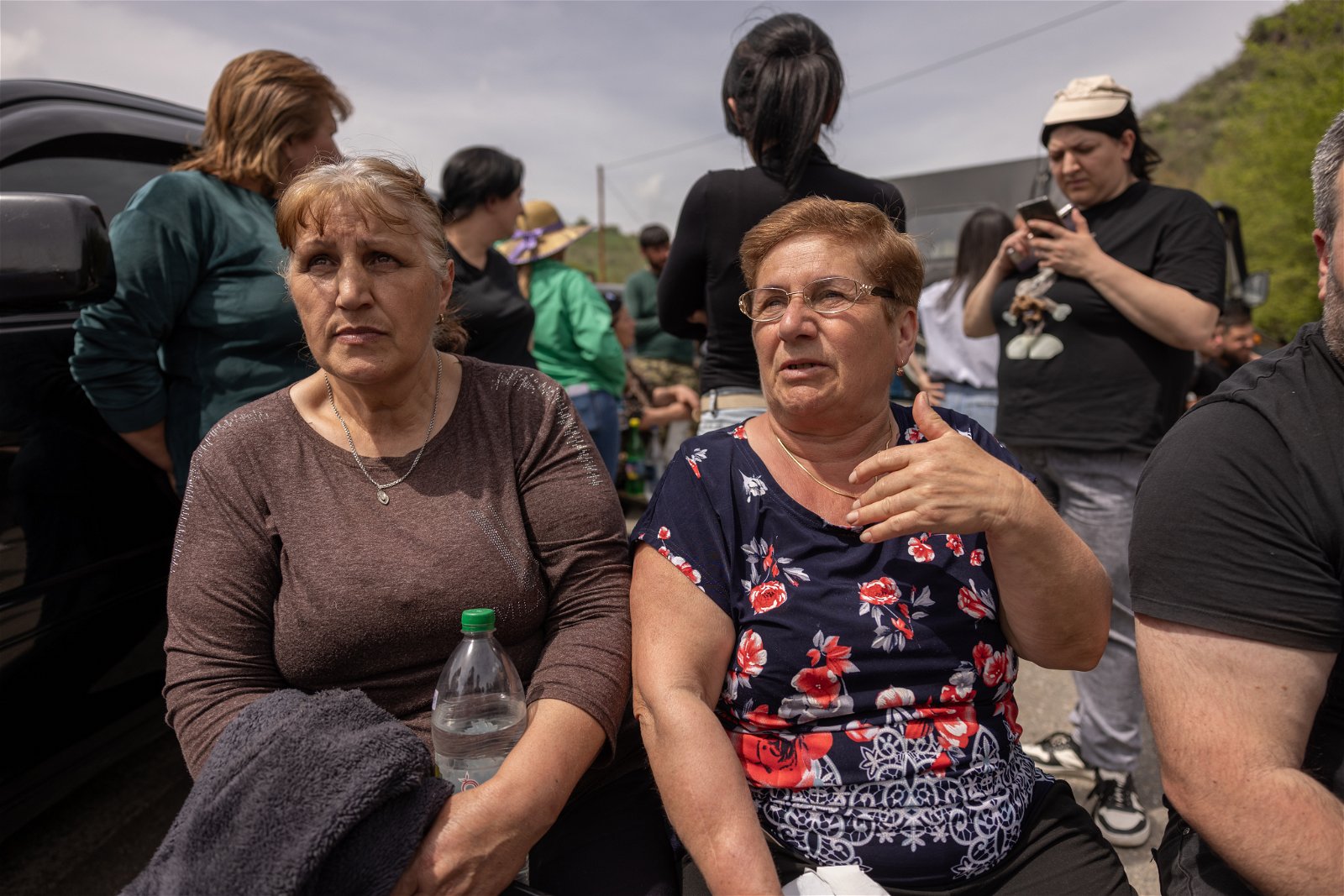
As residents of Kirants and Armenians from neighboring villages unite in protest against the concession of critical territorial positions in Tavush by obstructing the interstate road, PM Pashinyan, wielding authority over Armenia’s police and other institutional apparatuses, persists in repressive measures against the protesters.
The “Tavush for the Homeland” movement put out a statement strongly condemning the repressive actions carried out by the authorities against participants of the peaceful civil demonstration in Tavush on April 23. The use of unlawful, targeted and disproportionate force, along with the arbitrary arrests of several demonstrators, represent a flagrant violation of civil liberties, the statement argued.
The excessive use of force by police on April 23 resulted in severe injuries to Reserve Army Colonel Mihran Makhsudyan, who remains hospitalized. Political scientist Suren Petrosyan and three other citizens have been detained.
Members of the movement urgently called on relevant authorities to take immediate action by initiating a criminal investigation into the misconduct of law enforcement officers. Such actions not only undermine fundamental human rights but also erode the credibility of democratic institutions, they argued.
“We appeal to the Armenian Human Rights Defender, the international community and human rights organizations to provide an impartial assessment of the reprehensible treatment endured by peaceful demonstrators. It is imperative that those responsible for these actions are held accountable and that justice prevails,” the statement reads.
Acknowledging efforts to suppress their movement, they emphasized that their commitment to defending their homeland and advocating for their rights and freedoms remains unwavering. The people of Tavush will not be deterred by oppressive tactics, the statement asserts.
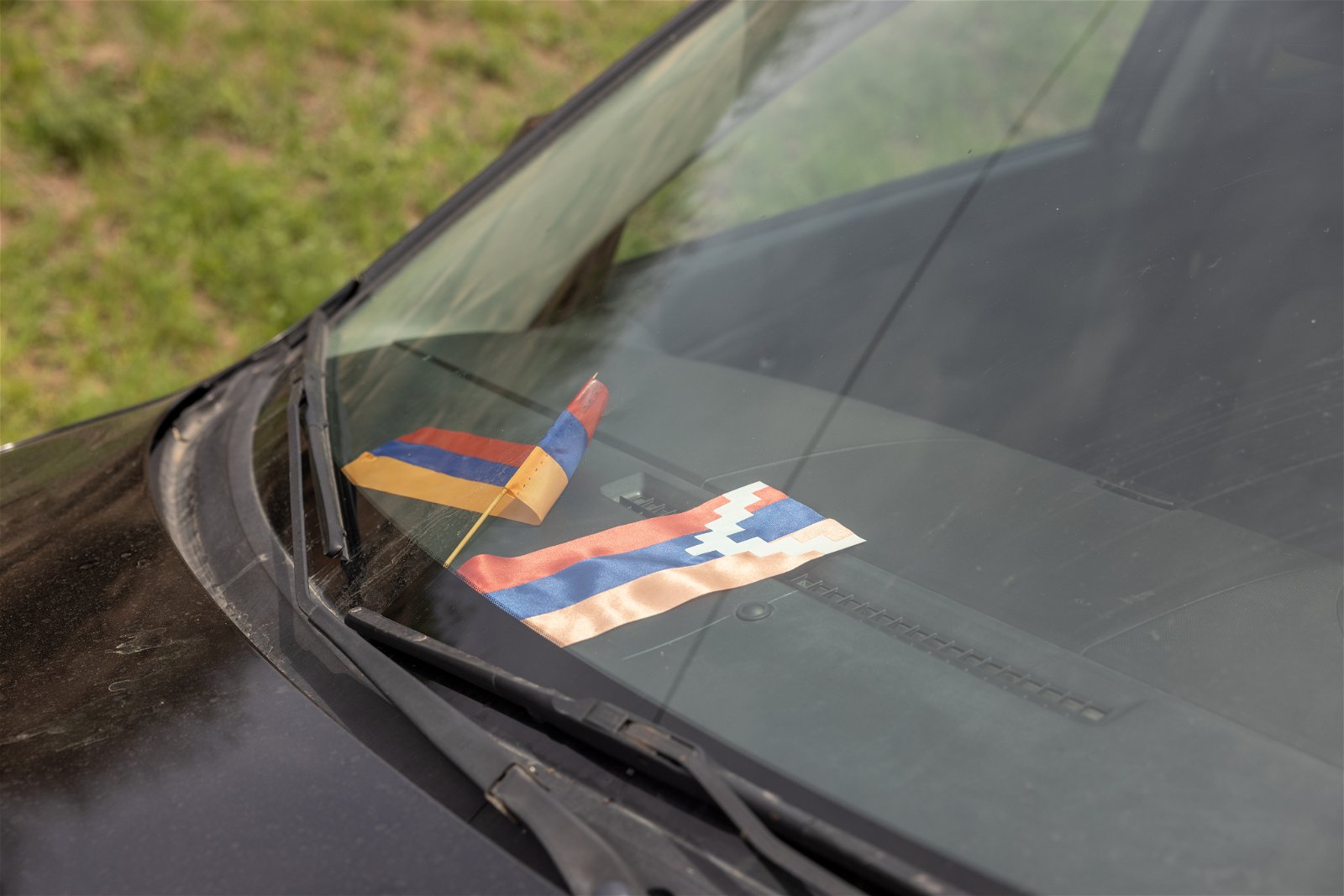
Archbishop Galstanyan addressed the policemen present, accusing them of being complicit in the surrender of the homeland.
“Can you honestly say you are at peace with yourselves? Will you return home tonight feeling content with your actions?” Galstanyan said. He urged them to reflect on recent events in the country, particularly referencing the ethnic cleansing of Artsakh by Azerbaijan in September 2023.
PM Pashinyan persists in arguing that surrendering land is necessary to prevent conflict. Yet continued territorial concessions are widely seen as capitulation to unilateral Azerbaijani demands. Meanwhile, Azerbaijani President Ilham Aliyev’s insistence on further concessions persists unabated.
Aliyev has demanded changes to Armenia’s constitution and the establishment of an extraterritorial corridor to its Nakhichevan exclave as preconditions for peace. In an April 23 statement, Aliyev said these changes must be made to achieve a comprehensive peace agreement between the two South Caucasus nations.
Aliyev cited references in Armenia’s constitution to the 1990 declaration of independence, which refers to the Republic of Artsakh. He called such references a significant obstacle to signing a peace treaty and insisted on their removal as a precondition for progress.
Aliyev also addressed Azerbaijan’s persistent stance on the four Tavush villages, emphasizing its complexity and the imperative for resolution during the delimitation process.
Furthermore, Aliyev condemned the arming of Armenia by France, India and Greece, asserting that Azerbaijan would not passively observe such actions. “If we see a serious threat to us, we will have to take serious measures,” he warned, a stance that underscores Aliyev’s determination to secure what he can from Armenia or what Pashinyan may concede.
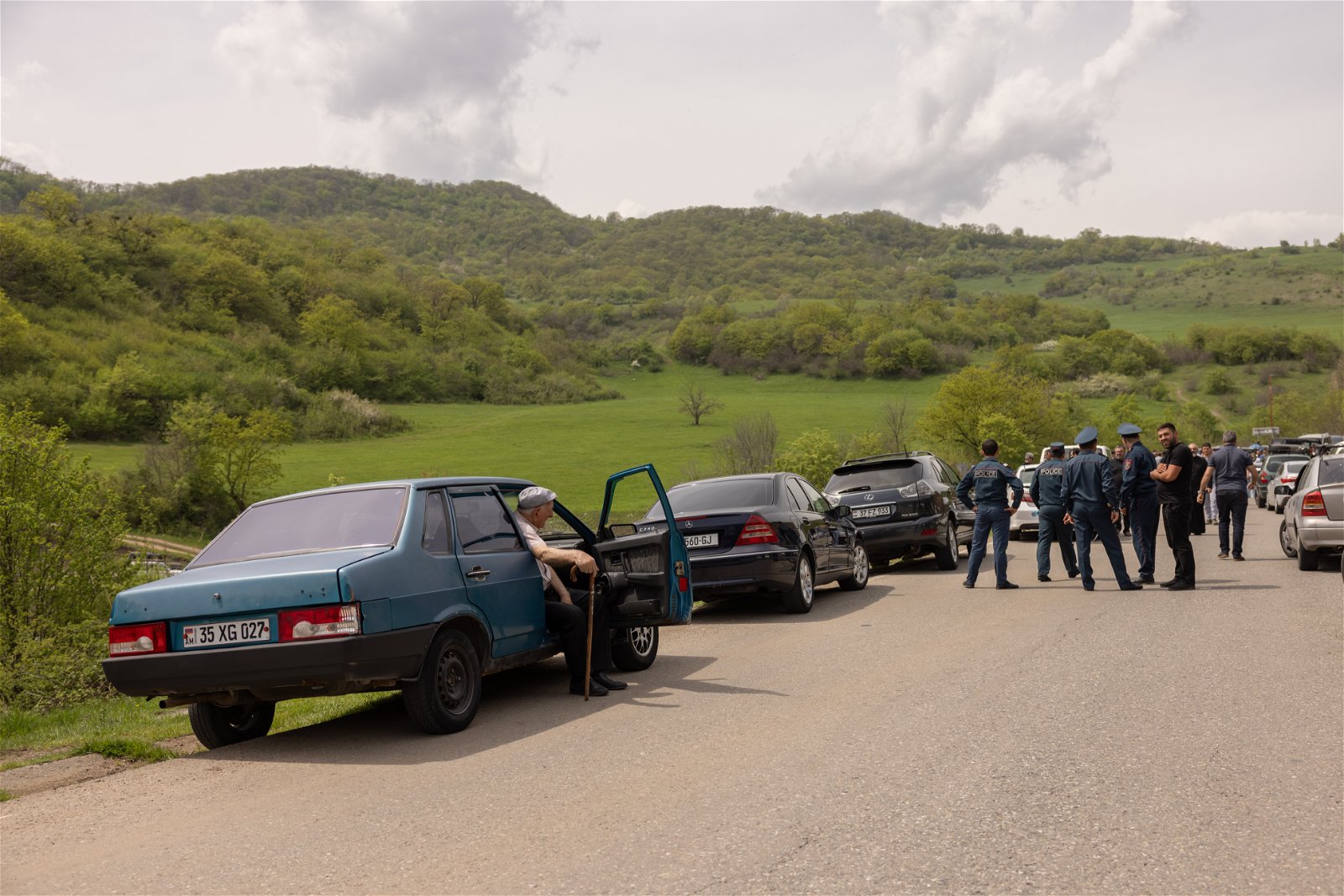
Commentary by photojournalist Anthony Pizzoferrato
Residents of Tavush, mostly from Kirants, Baghanis and Voskepar, continue to protest and block the Yerevan-Tbilisi interstate road between Kirants and Voskepar. Residents of several Armenian communities in the northeast Tavush province began protests late on April 19 after Armenian and Azerbaijani authorities announced a border delimitation deal, under which Azerbaijan will regain control of four former Azeri populated villages that have been abandoned since the early 1990s. Border villagers are concerned that the demarcation of the border in accordance with the Soviet-era configuration and 1991 Almaty Declaration will deprive them of access to their farmlands and complicate travel throughout the country, as sections of roads will fall under Azerbaijani control. Some residents have also raised concerns that Armenia’s withdrawal from current military positions will make them more vulnerable to attacks from Azerbaijan military posts. According to some residents of Kirants, approximately 40-percent of the village will be handed over to Azerbaijan on or before May 15, 2024. Currently, segments of roads that cross into what was Soviet Azerbaijan will be impacted if Baku blocks these areas, which could more than double travel time until a new road is constructed. Tensions have also continued to rise in both Voskepar and Kirants, as villagers are not allowing the National Security Service to demine the villages in preparation for the ceding of land to Azerbaijan. Leaders of the Armenian Apostolic Church, including Archbishop Bagrat Galstanyan, primate of the Tavush diocese, have joined residents in Kirants who continue to block the road leading to Voskepar.


There’s no point wailing, ranting and raging over that traitor, Pashinyan.
The time for words has passed, the time for action is now.
The Armenian Army must mount a coup and so save Armenia.
If they don’t then they are just as weak, cowardly and treasonous as Pashinyan.
And what is the alternative? War? Alijev will get the villages one way or another.
No he wont. If the Armenians are united he has no chance. Azeris are poorly trained. The only reason they made gains in Artsakh is because the Armenian army didnt come to the aid of the Artsakh Armenians.
Why are “historical borders from the Soviet era” being used as the basis for the meeting, since it was Stalin that ceded Artsakh to Azerbaijan? With the public availability of modern maps (See http://www.openstreets.org), there are choices !
Nobody knows why.
After the Coup d’Etat, what next. We need a Charles de Gaulle look alike to same the country. Do we have one?
Can the next in charge be worse? No.
@Vartan
Unfortunately, the Azerbaijani army was very well trained and armed to the teeth with the most modern weapons, thanks to the training provided by Turkey and Israel and the billions of dollars of weapons purchases by Azerbaijan from these two countries thanks to its hydrocarbon wealth.
During the First Artsakh War, Azerbaijan lost, because they were poorly armed, poorly trained, poorly led, lacked disipline, were cowards and fled from the battlefield, and they did not have proper military (which was all admitted by Heydar Aliyev).
Whereas Azerbaijan learned from its mistakes, and spend the last 26 years in training and modernizing its military and military tactics, Armenia became complacent and relied too much on now outdated military tactics and was only allowed to purchase weapons from Russia (as a member of the CSTO, the useless and impotent seventh-rate version of NATO), which were often second-rate Soviet technology.
It is this complacency as well as this reliance on one unreliable country Russia, that cost Armenia Artsakh. Of course, Pashinyan’s reckless and maverick policies are also to blame, because his pro-Western orientation angered Russia, who punished Armenia by giving the green light and colluded with the equally anti-Western and more Russophile Azerbaijan, in the Second Artsakh War.
Putting the lack of preparedness aside, if Pashinyan did not antagonize Russia with his pro-Western orientation, Russia would have prevented the Second Artsakh War, because Azerbaijan would not have dared to fight Russia, and Artsakh would have continued to exist. During the First Artsakh War, the opposite was true, when Azerbaijan under the anti-Russian Abulfaz Elchibey, was pro-Western and Armenia a firm ally of Russia.
To Robert: Thats some BS right there. First thing pashoglu did was purge the experienced capable generals and brought in his stooges to lead the army. Second he cowtowed to the west and distanced and angered putin with his pro west actions. What obligation did the russians have to backup the Armenians at that point? Theyre not our servants and they do what is right for Russia. Every nation should do that. Some of us Armenians need to grow up and realize no one owes us anything. We have to be smart enough who are our more natural and logical allies IN THE REGION. Third, Pashoglu did bother to update the army himself and instead kept blaming Sargysyan and Kocharian with corruption and neglect. Meanwhile he doesnt do anything to modernize the army himself but does enrich his personal wealth to the tune of 4 billion dollars. At least Serge and Kocharian had the wisdom to stay allied with Russia.
About the azeris, how well trained could they be by the israelis and turks? Israelis who couldnt handle hamas guerillas or hezbolla. Sure the azeris may have improved but not enough to make a difference if the Armenian were united. Its common knowledge that the Armenian army was held back during the second Arstakh war, leaving the Artsakh fighters mostly on their own. This was by design by pashoglu and his pupeteers.
By the way, drones are ineffective in a forested mountainous environment which is what Artsakh is. Stop with the superior weapons narrative – thats overblown. Armenias only chance at this point is to have pashoglu overthrown and realign with Russia.
Quite so, it seems that pride blinds to reason. Far too many Armenians thought Azerbaijan was still the rabble who were routed in 1994 . Also valid is the tie in of CTSO it meant there was very little Armenia could buy without breaching its commitments or other countries especially NATO members would be allowed to sell Armenia. The other conceit was Armenia protects Arktash and Russia protects Armenia so hence Arktash is fine notion, and we just can go through the motions in negotiations. As is well known Russia never pledged protection for Arktash citing that it was part of Azerbaijan as per Alma Alta declaration. The level of self belief amongst many posters here is shocking and some still tragically wallow in denial of the reality. Unless Russia was prepared to attack Azerbaijan on behalf of Armenia it couldn’t directly assist since 2008 due to Russian occupation of parts of Georgia, that country forbade transit of Russian military to Armenia whilst this was done by Georgia in anger with Russia rather than Armenia as such had a detrimental effect on the Armenian alliance with Russia since the land link was cut. Iran would allow Russian supplies to reach Armenia but this is a rather roundabout way of getting support. Being so reliant on Russia was a bad situation, dependant on its favours and with the decline of Russia relationship with western countries Armenia would be seen as a associate of a hostile power and sympathy and support would be lacking as was clear in 2020. Nevertheless Armenia is now wiser on a national level and with the decline in relationships with Russia can now be supplied with weapons by other countries and be more open minded in its military strategy just as post 1994 Azerbaijan was more open minded whilst Armenia languished…
@ Steven, not quite the truth. Yes Armenia has historically relied upon useless Russia. Unlike Turkey, that in this war fought directly and in coordination with Azerbaijan, Armenia’s supposed “wonderful ally” has NEVER EVER fought or coordinated directly with the Armenian army in any war or any skirmish. However this time the 2020 war was badly lost because of Pashinyan’s gross incompetence and his pure inability to orchestrate a successful war. In fact his first order after being installed as PM was to dismantle the once very capable war ready Armenian Army by ridding seasoned generals and installing useless incompetent people just like him. Sareh Sinanyan, Armenia’s minister of Diaspora made clear that they all knew the war was lost early on because of Pashinyan’s incompetence and inability to supply the front lines. Azerbaijan has always had gobs of money. Turkey and Israel have always been coordinating strategically with Azerbaijan. This war was frozen for 30 years. It wasn’t just “new technology” that changed. This time Azerbaijan, Turkey and Israel being the ultra opportunist, saw a great opportunity with the loser Pashinyan at the helm and took that opportunity to start a war to rid Armenians off their ancient homeland. Its doing so today with these village. BE CLEAR: This massive loss of property and land is mostly all because of Pashinyan’s gross inability, incompetence and most would say treasonous ineffective attitude to protect Armenia’s borders and interests. HE NEEDS TO BE RID. HE IS THE Problem.
my God the hubris here is something else. pashinyan is doing something that benefits Armenia. only those hard core let’s go to war right now kind of people don’t see that
Austin, you stop with the hubris. Your turkish brethren and you are getting away with genocide and ill gotten gains. The only people pashoglu is serving is your turkic nation.
Welcome to the diaspora. Those who cry for war will not be fighting it.
Brothers and sisters!
It’s okay. We are now at least a liberal democracy and we finalled freed Armenia’s from Russia’s yoke. This is what we all wanted in 2018. Be positive!
@Ben
No one is crying for war except the Azeris and turks. Wake up, they will take more and more Armenian land until there is nothing left. Seems the diaspora know them better than you do. Regarding the diaspora, it was many in the diaspora from Fresno and LA to Beirut who went and fought and died with their brothers in Artsakh in the first war. they helped liberate those territories that your Pashoglu handed back over to the turks. Don’t even talk about diaspora. they are the remnants of genocide survivors and have plenty of the true Armenian spirit
Brothers and sisters! Please stop complaining. At least we are now a liberal democracy and we finally freed Armenia from Russia’s terrible yoke. From the diaspora to the homeland, this is what we all wanted in 2018. Always remember that Russians are worst than Turks. France is our real ally and French people really love us because we gave their Aznavour. Be positive my brothers and sister! Turks are powerless against Armenians. We are now a democray and we are finally free of Russian tyranny. That’s what counts.
Yes brother! Even if Turks overrun Armenia and massacre all its inhabitants we will still be a democracy and free from Russia. That’s what really counts. I met a French lady recently. She was so nice to me when she found out I was Armenian. It felt really good. We have a great future now!
Whilst Pashinyan may well have retired experienced generals from the first war. In time they would have become a hoary old guard stuck in old ways and perhaps Pashinyan has been more concerned about personal loyalty than military ability which is detrimental. There is an ignorance, drones and various other weapons which were a sci fri realm in 1994 and there was a need to adjust to the new reality. What served one well then wasn’t necessarily going to serve one well again . Azerbaijan as the defeated was more open minded to new ideas than Armenia in addition to being able with its petrodollars be able to finance the transformation of its military. Armenia became conceited and complacent aggravated by its alliance with Russia which led to misplaced confidence in its position. Railing will NOT alter the self evident facts.
This war was different Charles because Turkey and Israel and some would say England at least from a pure propogandah point of view, fought and coordinated DIRECTLY on behalf of Azerbaijan. It wasn’t just drones. It was a coordinated effort by criminals along with the pure incompetence and treasonous indifference by a useless loser fraud pretending to be PM. He was the perfect opportunity.
Charles, you are right, let’s forget Russian kartoshkas and embrace Turkish values!
I made lots of money introducing members of Nikol’s Civil Contract to Turkish politicians. Why you think Nikol does not attend dictator Putin’s inaugaration but front seats to Erdogan, brotherly Turk’s, inauguration?
Yes brother! Russians are worst than Turks.
No foreign power meddling in Armenian affairs should be trusted but at the top of the list should be Turkey. Turkish politicians are wolves in sheep’s clothing and I will trust them when pigs grow wings. Er-dog-an is an opportunist scoundrel and a notorious genocide denier and any Armenian leader who even remotely treats him as a “friend” is a traitor to the Armenian nation. Nikol’s Civil Contract party is a stain on the face of the Armenian nation and should be tried for treason.
The Russophobes on here need to wave their magic wands and change Armenia’s geography.
Why does the Armenian Weekly allow comments signed by “Monte Melkonian” ????? He was killed in 1993. Very unprofessional.
The Russophiles here need to wave their magic wands and see where Russia is, no common border, what it’s doing busy at war in Ukraine, what it gets upto attacking Georgia, abandoning Armenia, cavorting with Azerbaijan and Turkey.
Sir Charlie,
Wave your magic wand and see where Kaliningrad is? We had opportunities to join the Russian union but we rejected it. As the war in Ukraine neared, and Russia downgraded its ties to Armenia, it was already too late for Armenia. After the Russian bear brings your type to its knees in Ukraine, and its only a matter of time when, he will turn his attention back to the south Caucasus.
@ Gurgen, I see Kaliningrad the northern half of the former German settlement of East Prussia, known historically for the battle of Tannenberg, Teutonic knights , Amber, Immanuel Kant and the Koenigsberg bridge conundrum, which had many Russians settled in the 1940s after the Germans were expelled. It’s strange place as the Germans were medieval settlers in the land of the Baltic Prussian peoples and the southern half was assigned to Poland in 1945 and populated with Poles displaced from the westward expansion of the Soviet Union. Now the Russian exclave is surrounded by enemies of NATO countries at land and across the Baltic sea. As for Russia and Ukraine even if it gets Kiev to accept a peace such a settlement will be deemed odious and unacceptable by NATO and the EU and sanctions pressure will remain on Russia until it complies or incredibly is able to defeat the western allied powers or they implode as state entities a wholly different proposition from bending Ukraine backed by NATO to its will! Unless Russia falls out with Azerbaijan Arktash is about as lost cause as East Prussia! As even if Russia returns to the south Caucasus, it unless having a damascene conversion is committed to Arktash as part of Azerbaijan! Russia has it’s own priorities and they aren’t necessarily the same as Armenias.